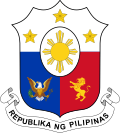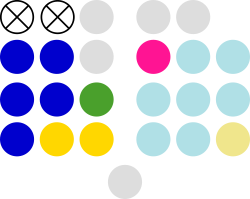| 12th Congress of the Philippines | |||||
|---|---|---|---|---|---|
| |||||
 | |||||
| Overview | |||||
| Term | July 23, 2001 – June 4, 2004 | ||||
| President | Gloria Macapagal Arroyo | ||||
| Vice President | Teofisto Guingona Jr. | ||||
| Senate | |||||
| Members | 24 | ||||
| President | Franklin Drilon | ||||
| President pro tempore |
| ||||
| Majority leader |
| ||||
| Minority leader |
| ||||
| House of Representatives | |||||
| Members | 261 | ||||
| Speaker | Jose de Venecia Jr. | ||||
| Deputy Speakers |
| ||||
| Majority leader | Neptali Gonzales II | ||||
| Minority leader | Carlos Padilla | ||||
 |
|---|
The 12th Congress of the Philippines (Filipino : Ikalabindalawang Kongreso ng Pilipinas), composed of the Philippine Senate and House of Representatives, met from July 23, 2001, until June 4, 2004, during the first three years of Gloria Macapagal Arroyo's presidency. The convening of the 12th Congress followed the 2001 general elections, which replaced half of the Senate membership, and the entire membership of the House of Representatives.




